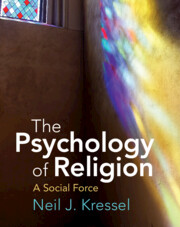Book contents
- The Psychology of Religion
- The Psychology of Religion
- Copyright page
- Contents
- Detailed Contents
- Preface
- Acknowledgments
- Part One Introduction
- Part Two The Great Theorists
- Part Three How Psychologists Study Religion
- Part Four How People Think About and Experience Religion
- Part Five The Effects of Religion
- 8 Religion and Health
- 9 Religion and Morality
- 10 Religious Extremism
- Part Six Using the Psychology of Religion and Spirituality
- References
- Index
- References
10 - Religious Extremism
from Part Five - The Effects of Religion
Published online by Cambridge University Press: 01 November 2024
- The Psychology of Religion
- The Psychology of Religion
- Copyright page
- Contents
- Detailed Contents
- Preface
- Acknowledgments
- Part One Introduction
- Part Two The Great Theorists
- Part Three How Psychologists Study Religion
- Part Four How People Think About and Experience Religion
- Part Five The Effects of Religion
- 8 Religion and Health
- 9 Religion and Morality
- 10 Religious Extremism
- Part Six Using the Psychology of Religion and Spirituality
- References
- Index
- References
Summary
This chapter argues that throughout history many religions have proved themselves capable of sparking and fueling hostility toward outsiders and even toward people in the same faith who are viewed as unacceptable for one reason or another. We examine recent manifestations of extremism in Christianity, Hinduism, Buddhism, Judaism, and Islam, explaining that analysts often disagree about the extent to which religious beliefs and institutions are causally important. Key terms such as religious extremism, fundamentalism, radicalization, and terrorism are defined, noting the crucial importance of maintaining a distinction between the religious extremist and the extremely religious. Though we suggest researchers face many methodological challenges, we explore a broad range of empirical studies on related topics. The chapter also reviews theory and research on why and how people become religious extremists. We further draw on the psychology of radicalization, arguing that nowadays most scholars believe that there are cognitive and behavioral processes at work. Some people may move directly to carrying out terrorist deeds without acquiring much group ideology or religious belief.
Keywords
- Type
- Chapter
- Information
- The Psychology of ReligionA Social Force, pp. 415 - 464Publisher: Cambridge University PressPrint publication year: 2024

